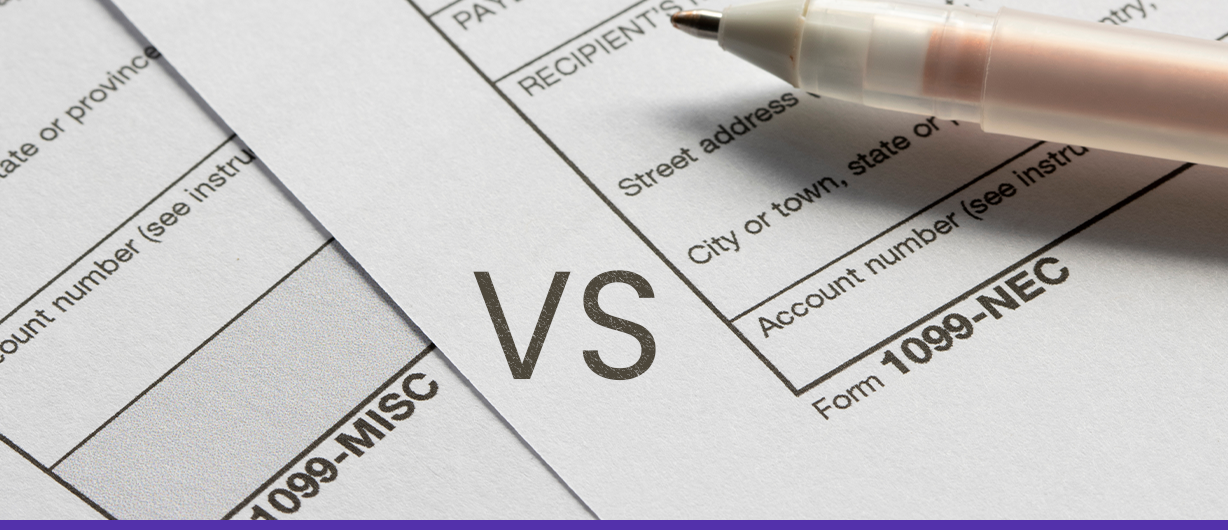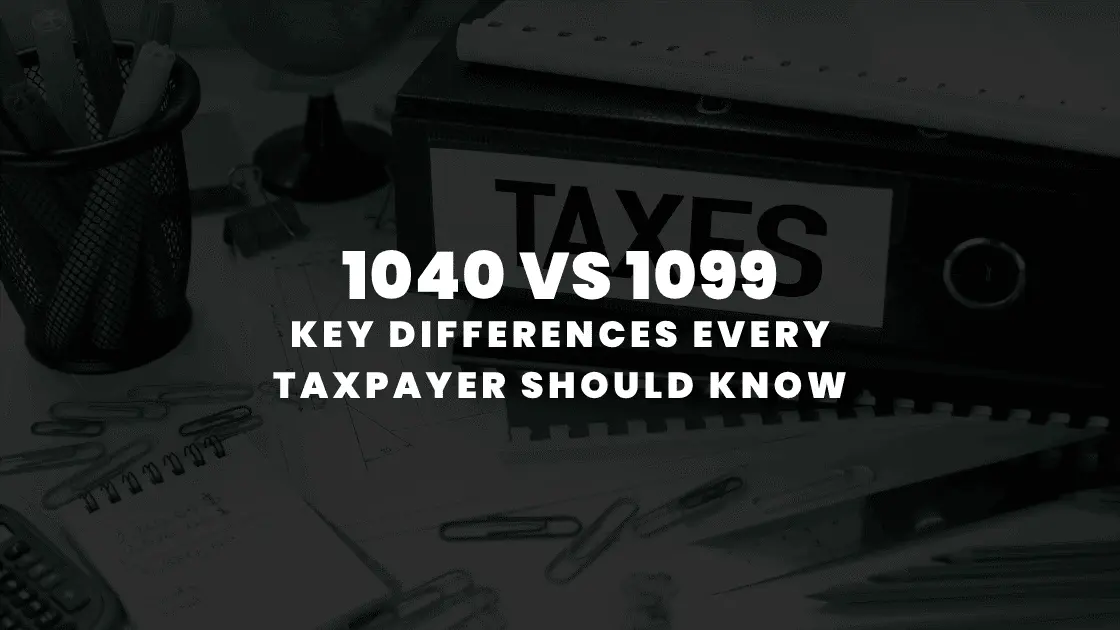January 9 2024 | By Farwah Jafri | 6 minutes Read

So, What is a 1099-NEC Tax Form?
And What is a 1099-MISC Tax Form?
Deep Dive: Major Differences between 1099-NEC and 1099-MISC
Focus of Reporting
Reporting Threshold
Changes in the Form(s) over the Recent Years
Are There Any Penalties for Non-Compliance or Delays in Filing the 1099 Tax Forms?
The Main Takeaway
It’s easier to set up a business and even run it to achieve business goals, but there’s a lot more to running a business than just producing and selling goods and/or services. One of the many overwhelming things that can bog a business’ operations down, is the several types of tax forms that are required to be filed throughout the year for different purposes.
But today, in this blog post, we’ll be focusing on the tax forms whose deadlines are fast approaching: the 1099 tax forms. Forms, you ask? Yes. Even within the 1099 category, there are sub-categories, and this blog talks about the major differences between two of those important sub-categories, the 1099-NEC tax form, and the 1099-Misc tax form. Both of these tax forms aid in the documentation of various income streams. Let’s take a deeper dive, because it is imperative for businesses to understand the differences between the two if they wish to:
1. Stay diligently compliant,
2. Avoid pitfalls related to accurate and timely tax filing,
3. Avoid penalties for non-compliance.
The 1099-NEC, or Non-Employee Compensation, is a tax form specifically designed for reporting payments made to independent contractors, freelancers, and other individuals who are not on the regular, salaried payroll of a business, but whose services have been used by said business.
The main purpose of the 1099-NEC is to report payments to the IRS that are made to individuals hired temporarily, individuals whose services have been employed without pulling them on to the company’s regular payroll, and to consultants, such that the company has paid them at least $600 in a given tax year. Examples of such payments include remuneration provided to freelancers, professional service providers, and individual contractors or consultants who have been approached to provide services to the business.
The 1099-NEC has recently been reintroduced by the IRS around 2020, to further streamline the tax filing processes for the 1099-MISC tax form, which is broader.
The 1099-MISC, on the other hand, is used for the filing of Miscellaneous Income. This is a much more versatile form covering a wider range of payments that a business has made or makes during a tax year. Examples of these payments include income generated via rental properties, royalties, prizes, and even awards. Seeing as how there are multiple streams of income an individual or even a business can generate, it makes sense that the IRS has streamlined the requirements for tax filing, so categorization, record keeping, and trackability can all be improved.
Do note, however, that the 1099-MISC does also include non-employee compensation. The major benefit of this tax form has thus in effect been revised to catch all the income that does not fall neatly into any other specific categories.
The most important or glaring difference between the 1099-NEC and 1099-MISC is the fact that their primary focus of reporting is very different. While the 1099-NEC is specifically tailored for reporting non-employee compensation, the 1099-MISC tax form covers a broader spectrum of income types, making it a more versatile form, especially given the fact that there will always be some categories that keep cropping up as new, and there will always be others that have a relatively smaller number of people falling into their fold as compared to other general categories, such as business income or salaries and wages.
It is thus extremely important to understand the nature of payments made so that businesses can determine which form to use and when, and also whether both need to be used or not, as some cases might necessitate the use of both. In short, when the payments are strictly for non-employee compensation, the obvious choice is 1099-NEC, but when if your income includes a mix of multiple streams generating cashflow, such as rent, royalties, or other random category payments, then the more applicable choice would be the 1099-MISC.
The 1099-NEC and 1099-MISC have another major difference: the threshold of reporting, based on which it is easy to distinguish which form should be used.
The 1099-NEC requires reporting of non-employee compensation of at least $600 per tax year.
The 1099-MISC on the other hand, has different thresholds depending on the type of income that a business or individual generates. For instance, a 1099-MISC form would be used if an individual or business makes $20 in royalties or broker payments, instead of, say, dividends or tax-exempt interest.
Businesses need to be actively and diligently mindful of these thresholds to ensure accurate and timely reporting, as well as compliance with IRS regulations. They also need to be on top of any frequent and regular changes that the IRS may introduce.
If a business fails to report income that meets or exceeds the specified thresholds, it can result in severe and penalties and other consequences detrimental to both the business and the business owner.
The way businesses report non-employee compensation has changed significantly since the reintroduction of the 1099-NEC by the IRS. Previously, these payments were included in Box 7 of the 1099-MISC form. However, now that a separate form (the 1099-NEC) exists, it is necessary for businesses to use the newly specified form exclusively for reporting non-employee compensation.
This seemingly minor change has simplified the reporting process by providing a dedicated form for non-employee compensation, thus increasing and improving the streamlining of tax-filing as both a process as well as an experience, for businesses.
In short: yes.
The IRS has certain purposes for collecting and recording tax related numbers and detailed information, and just like any other individual or business entity, they too have certain objectives and deadlines to meet if not exceed. They too are answerable to multiple heavy-duty stakeholders. Therefore, understanding the consequences of non-compliance is an essential item for businesses to prioritize. Equally important is to ensure accuracy and timeliness of the tax filing process.
Both the 1099-NEC and the 1099-MISC forms have penalties attached to them if they’re filed after deadlines or not filed at all, or file incorrectly, or even if they’re merely filed inaccurately.
The penalties that individuals and businesses can face due to non-compliance can range anywhere from fines per form, to stricter and more severe consequences, depending on the nature and extent of failure to comply. Thus, unless you have free money lying around to blow away on easily avoidable “inconveniences”, it is of extreme importance for businesses to stay on top of deadlines and changing and evolving tax regulations, as well as to maintain accurate records of payments made throughout the tax year, regularly, and diligently.
When it comes to tax reporting, precision is of paramount importance. This is why Monily offers you a supreme blend of artificial intelligence as well as human intelligence, to ensure that you meet the requirements of running business operations such that they facilitate your core business activities, rather than hinder them. As the tax landscape continues to evolve, it is imperative to stay informed, and proactively ensure that you as a business are fulfilling your responsibilities as responsible members of society, while Monily helps you come up to speed and minimize any risks of compliance related issues.
Our free consultation slots are running out fast, so we’d recommend you reach out to us without any further delay, so we can help you close this tax year in peace!
Also Read: What Is The 1099 NEC Form? How To File a 1099 NEC?
Subscribe for business tips, tax updates, financial fundamentals and more.
MORE BLOGS

Running a small business means every dollar matters. You work hard to earn revenue, manage expenses, and grow steadily, yet tax time often feels like money […]
Learn More →
Tax season can be overwhelming, especially when you’re staring at multiple forms with numbers instead of names. Two of the most common, and often misunderstood, are […]
Learn More →
Working extra hours can feel rewarding, after all you’re putting in more time, showing dedication, and earning more money. But when you look at your paycheck, […]
Learn More →